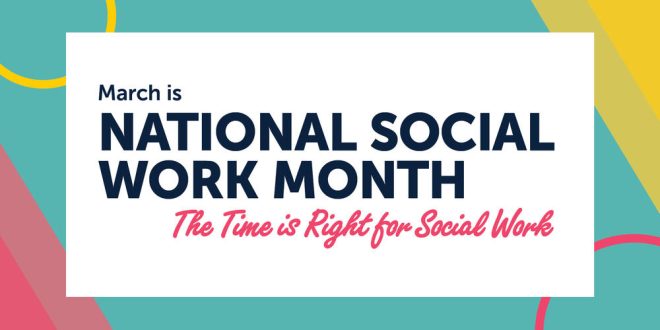With as many lives as have been changed by COVID-19 over the past two years, the 2022 “National Social Work Month” theme for March of “The Time is Right for Social Work” is quite fitting.
Led by the National Association of Social Workers, the theme underscores the contributions social workers have made to this nation for more than a century and how the services they provide are needed more than ever as the nation addresses issues such as economic inequality, systemic racism, the need for improved health and mental health care and COVID-19.
The highlight of the special month is “National Social Workers Day” on March 15.
Emily Owens, LCSW, is the Deputy Chief Clinical Officer at Hamilton Center Inc. (HCI) and thinks the special month is important to help people better understand the contributions made by social workers.
“Your general lay person doesn’t know everything that social workers do,” Owens said. “A lot of times, they hear the term ‘social work’ and immediately think of child protection. They might have even a negative connotation with that. It’s important for people to be aware that most social service agencies and even some bigger corporations now hire social workers to assist employees with their everyday stressors and to help route them to treatment possibilities if needed.”
In 1984, the White House officially recognized National Social Work Month. Since then, each year has had its own theme and goal to bring more understanding to what social workers do.
Past themes have focused on societal issues like AIDS/HIV, hate crimes, violence prevention, children in poverty and homelessness. In the late 1990s and early 2000s, the themes for this month were geared more toward awareness on how social workers can help their communities.
William Andrews, MSW, is a therapist at HCI’s Hendricks County office. He entered the social work field based upon the hierarchy of his household as a youngster.
“I’m the oldest of six children and I’ve always been the people-helper type,” he said. “I got an undergraduate degree in psychology because I had never heard about social work. I got a job working with teenagers, but I found that my skills weren’t strong enough at the time to meet their needs.”
Andrews admits he didn’t want to follow the psychology program through to the doctorate level, but still wanted to provide direct service.
“I started looking around and I found out about the Master of Social Work (MSW) program,” he added. “I got my MSW and have been in the field ever since.”
Andrews has experienced many positive outcomes during his career.
Among them are:
- Helping a mother deal with her child’s suicide;
- Assisting clients with addiction issues to become alcohol/drug free, find good jobs, experience healthy relationships and become active parents in their children’s lives;
- Assisting clients break off abusive relationships and become independent; and
- Helping a combat vet deal with PTSD.
Like many industries in today’s world, attracting new hires as social workers is becoming more and more difficult.
Owens said the additional career options for social work graduates makes it more difficult for community mental health facilities like Hamilton Center.
“There’s just so many more opportunities now for social workers,” she said. “Lots of colleges, large corporations and hospital systems need social workers. Right now, there’s just not even enough people going into the field. Even though we’ve seen an increase over the years, it’s still not enough to meet the need.”
Owens added that other opportunities exist to generate more interest in the field. She noted that student loan forgiveness for social workers, especially in those rural counties where the need is great, could be helpful.
She points to HCI’s internship program as a successful way for the organization to attract more candidates.
“Being able to provide internship possibilities for those students that are in social work programs and other related human services fields gives them a good opportunity to gain experience and see all the wonderful things the organization can offer,” Owens said. “
Hopefully they’ll want to either stay with Hamilton Center or stay within the field in the communities where they went to school or areas of great need.”






